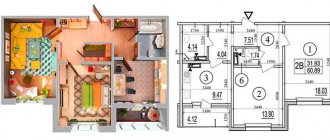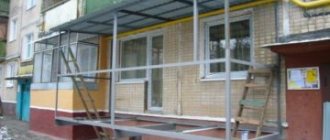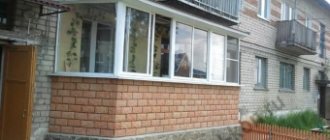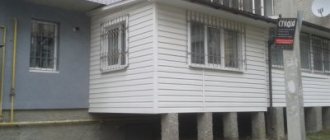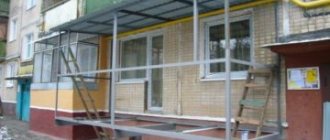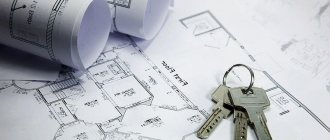Slugs, dampness, fleas, icy floors and wet walls – there are various “horror stories” about real estate located on the first floors of apartment buildings.
Traditionally, one-room and two-room apartments located “above the basement” are slightly lower in price, which attracts young families.
But is an apartment on the ground floor really that scary? We will try to reveal the pros and cons of real estate in the article.
Who buys apartments on the ground floor?
Potential owners can be divided into several groups:
- Pensioners and older people . They value proximity to the street (no need to carry things up and climb flights of stairs) + take into account the cost. The price tag for apartments located on the floor is 10-20% lower compared to the same ones, but located on the 2nd, 3rd or 4th floors.
- Families with children . If you have a child, then walking with strollers/scooters/bicycles turns into hell. First you need to get it all out of the apartment and house, and then lift it to the top floor. Living on the ground floor automatically makes this task easier. And there is no risk that the child will fall out of the window.
- Businessmen. Real estate on the first floors of Khrushchev and Brezhnev buildings attracts investors. If the apartment is located in a public area, then it can be sold as a store or coffee shop. In this case, the price of the apartments will be higher. But it’s worth talking separately about the commercial segment and the specifics of removing real estate from the housing stock. For now, you need to know that purchasing an apartment on the ground floor can be a profitable investment.
When purchasing real estate you need to consider:
- year of construction (for example, in an old housing stock, apartments are located directly above the basement, and in new buildings - above offices or retail premises);
- location (windows overlook the courtyard, parking lot, green area, roadway, sidewalk, etc.);
- distance from the center (one thing is a one-room apartment in a public place, which in the future can be sold at a profit; quite another thing is an apartment on the outskirts overlooking a deserted wasteland);
- presence/absence of major repairs (this determines how often you will be “drowned”, how the basement will stink, and so on);
- the condition of the apartment (in old Khrushchev-era apartments, it’s easier to demolish everything and build again without repairs than to try to repair crooked walls and floors);
- area and neighbors (so that drinking parties with swearing and swearing do not take place under your windows).
Let's figure out what advantages and disadvantages real estate has.
pros
First, let's look at all the possible benefits.
Convenience
Residents of the first floors do not have problems with the elevator - they simply do not need it. This is an excellent option for a family with children: the child can go for a walk and play near the house - he will be visible from the window.
And if the baby does not yet know how to move independently, it is much more comfortable and safe for a mother with a stroller to go outside without using an elevator or climbing several flights of stairs. In addition, living on the lower floor is a convenient solution for older people and people with disabilities.
- Residents of the first floors save on the delivery of large-sized furniture or building materials: often getting into the apartment with the help of loaders is free, and doing it yourself does not cause difficulties.
- If the furniture does not fit through the door, it can be brought in through the window.
- If the key is lost or a dangerous situation arises, the window opening can be used instead of the door.
Heating and water supply
Residents of the lower floors receive better public services: they have stronger water pressure and warmer radiators. It's all about pressure - hot water reaches the apartments located upstairs worse, since in most apartment buildings water is distributed to the radiators from bottom to top.
Local area
Another pleasant plus of an apartment on the ground floor is the illusion of living in a cozy country house. If there are neat low bushes, a lawn and several trees next to the windows, you will feel close to nature. The surrounding area can be improved independently - this is especially appreciated by those who like to “tinker in the ground.”
A car parked under the window will always be under supervision, and if someone gets in the way, quickly getting dressed and moving it won’t take much time.
Price
Thanks to stereotypes about the “illiquidity” of the first floor, apartments on them are 10–15% cheaper, which means you can save on purchasing housing. Property prices on the more popular middle floors are higher.
If you successfully choose an apartment with high traffic in a new area, then it can be sold at a higher price. It will be possible to make money if the infrastructure is not developed and the property is of interest as a commercial premises.
Neighbours
Another advantage of the first floor is the absence of neighbors below. If flooding occurs, you will not have to pay for expensive repairs and new furniture. Also, no one will complain about the rumble from chair legs, stomping and noise: this is especially true for families with small children.
Possibilities of redevelopment
The big advantage of the first floor is that there are no residential apartments below, which means the law provides for the transfer of wet areas to more convenient places. For example, if the kitchen is equipped with an electric stove, it can be installed in the living room.
If desired, residents of the first floor can refuse gas supply altogether. Relocating or expanding bathrooms also does not require taking into account the location of the rooms below.
To disconnect an apartment from gas, you need to contact your gas inspector, and to obtain permission for redevelopment, contact a specialized organization that has a license to carry out design work.
Advantages of purchasing an apartment on the ground floor
It may be worth looking at several options before purchasing. You will see for yourself that apartments are different from apartments. Some apartments on the 1st floor will have a view of the park and will be completely renovated, while others will be hard to look at without tears.
Plus number 1. Price of apartments on the ground floor
Traditionally, real estate on the first and last floors is considered “illiquid.” In modern new buildings the trend is less pronounced than in Khrushchev and Brezhnev buildings.
Those. the price tag of a “square” will be 10-20% lower compared to the same apartments, but located on 2, 3 or 4 floors. As a result, you can:
- save on buying an apartment;
- reduce the cost of obtaining a loan or subsidy;
- invest part of the money immediately in repairs, and not live by the principle: “We’ll move in, and then we’ll gradually restore order...”.
Plus number 2. No elevator fee (with reservation)
Residents of the first floors have long been “suffering” with the question of whether they need to pay for an elevator . Practice follows the path of recognizing such objects as common property, i.e. all properties must bear maintenance costs. Roughly speaking, you have to pay, even though you don’t use it.
But since 2021, judicial practice has taken a different path. On January 29, 2018, the Constitutional Court considered the case and issued a ruling that could “bring a different breath” to the “elevator issue.”
The Constitutional Court was contacted to protect the interests of the owners of residential premises. It was revealed that the decision of the meeting established different rates for payment for the maintenance of common property. This allegedly violated the principle of equality of responsibilities of owners for the maintenance of common property.
The Constitutional Court considered the case and made a decision: the law does not directly prohibit the possibility of differentiating tariffs for the maintenance of common property (including elevators). Those. owners can agree “on the spot” so that residents of the first and second floors still do not pay for what they do not use.
Plus number 3. Convenience
To get to the apartment, just climb 3-4 steps. It's comfortable:
- families with small children;
- pensioners;
- people with disabilities.
When you do repairs and carry furniture / cement / tools / plumbing / boards / parquet / garbage bags and much more, you will remember more than once and say: “It’s so good that we chose an apartment on the first floor!”
It’s also convenient that no one will complain about you from below . Those. a child can calmly run and jump around the apartment even at 2 a.m., and you won’t have to endure the sidelong glances of neighbors from the apartment “below you.”
Plus number 4. Evacuation without problems
In the event of a fire, you can quickly get out of the apartment (either through the doors or through the window). There is no risk that the cat will fall out and break.
An unobvious advantage of apartments on the ground floor is the ability to make any redevelopment (with the exception of unauthorized demolition of load-bearing walls).
In Khrushchev-era buildings you can change the “wet zones”, i.e. bathroom and toilet. If you invite a professional designer, you can make any dream project come true.
Plus #5. Cellar in an apartment on the ground floor
If you wish, you can arrange a place to store seasonal seams, vegetables, and fruits. The legislation does not clearly stipulate what needs to be done to obtain permission. Moreover, similar facilities were provided for in individual houses even at the construction stage.
It is important that the boundaries of the basement:
- did not interfere with laid communications (hot and cold water supply, sewerage);
- did not go beyond the boundaries of the building;
- did not create obstacles to the use of common property by other owners.
The location of the cellar in a typical high-rise building is a niche under the balcony. You will need:
- dig a hole, which in the future will become a basement;
- cement the walls of the niche to reduce the risk of collapse;
- equip the cellar with cinder blocks or bricks (do not forget to waterproof it to protect against dampness);
- plaster the walls or simply cover them with plastic; Insulation can be laid on the street side to reduce the risk of freezing.
If you do everything right, you will get additional space akin to a “dark room” in Khrushchev-era buildings . In a one-room apartment or two-room apartment of the Soviet type, storage space will definitely not be superfluous.
Plus number 6. Arrangement of the balcony and “plot”
You yourself have seen how people living on the first floors “fence off the territory” with small fences and make front gardens. There are property owners who “take out” the balcony or create entire loggias. Some citizens came up with the idea of increasing the area of the apartment by “seizing new territories” and almost creating an extension.
There was a time when they “turned a blind eye” to such actions, and everyone living on the first floor did or did not make a loggia for themselves at their own discretion. In 2021, permits will have to be obtained.
For example, we bought an apartment, and now we want to arrange a loggia. Or you need to make a separate entrance to the apartment on the first floor. What is needed for this? Have to:
- find out whether an extension is allowed in a particular building (they will refuse if you violate the architectural integrity of the object, remove load-bearing walls or affect nearby utility lines);
- collect to obtain permission (extension project + permission from the operating organization, required + approval from the architectural department + “go-ahead” from Mosgaz + permission from Mosvodokanal + “paper” from Mosenergo, fire organization); It is also necessary to submit photographs of the property, consent of neighbors, a BTI certificate, and certificates of ownership;
- make a prepared package to the city administration;
- get permission;
- build a balcony or loggia in accordance with the project;
- put into operation and sign the act;
- obtain a new certificate of ownership of the apartment (which will reflect the configuration changes).
Remember that the land plot on which the loggia will be located must be transferred for individual residential development. If you cannot “buy out” the land, then you will be offered to enter into a lease agreement. Another option is to install a balcony on construction piles.
The question arises: why bother with documents if you can start construction right away? A citizen who carries out unauthorized construction does not become the owner of such real estate.
The loggia, which was erected without permits, is subject to demolition. But the law allows for an appeal to the court to recognize the right of ownership of an unauthorized construction. The case will be long, complex and exhausting.
By the way, it is not recommended to buy real estate with “left” balconies and loggias (when we are talking about uncoordinated redevelopments).
Plus number 7. Buying an apartment for resale to a business
This was in demand before. Today, all the “tidbits” have long been passed on to businessmen. In place of the old one- and two-room apartments, the following open:
- shops and retail outlets;
- offices;
- communication points and many other objects.
But before investing money, check the location of the property and calculate its characteristics: location, traffic, availability of other retail outlets nearby, popularity of the place, and so on.
The benefits have been studied. But this does not answer the question of whether it is worth buying an apartment on the ground floor. You need to check what disadvantages are hidden behind the purchase of real estate.
Upper floors, starting from the sixth
Apartments on the upper floors are more expensive. Especially if it is a new building with a beautiful view of the lakes, mountains or city. In old buildings, an apartment on a high floor can be purchased cheaper
. As a rule, a microdistrict of old housing stock is already completely built up. The windows can only have a view of the windows of the neighboring house.
The advantages of living on the upper floors
include the following:
- fresh air;
- no noise from the street;
- dust and dirt do not enter the apartment;
- protection from robbery (it is impossible to get into the apartment through the window and go unnoticed).
But there are also a number of disadvantages. There are strong drafts on the upper floors. Especially if the house is not surrounded by other houses. If the elevator breaks down, it will be quite difficult to get home. You'll have to climb the stairs. There can only be one small elevator in a house. Oversized loads will need to be carried manually using stairs. In the event of a fire or other emergency, it will take longer to descend from the upper floors.
There may also be other disadvantages, such as fear of heights
: a person will not be able to go out onto the balcony, let alone go down the stairs.
Why is the first floor bad when buying an apartment?
Let us make a reservation that these shortcomings are not typical for all apartments, but only for those located in separate houses. For example, some residents of the first floors complain about constant sewer blockages, while others have not even heard of such a problem. Or someone screams about periodic flea infestations, but someone has not encountered this in 60-70 years of living on the first floor:
- Fleas, rats, mice, cockroaches and other “cellar inhabitants” . Rodents and insects come from below. If the apartment building complies with the requirements of epidemiological services and carries out periodic treatments, then there should not be a problem. Therefore, it is more important than anyone else for residents of the first floors to monitor the timely cleaning of premises and the implementation of preventive measures.
- Intercom sounds and constant conversations under the windows . Heard in apartments whose windows face the porch. People complain about cigarette smoke, knocking, and constant talking. If your one-room apartment has windows facing the opposite side, then the problem of sound insulation from “entry noise” can be solved with a good entrance door.
- Slugs, dampness, mold smell . The problem arises for residents of the first floors only if the basement is “wet”. Therefore, before buying real estate, do not be lazy to go down there and check if everything is in order. Humidity from running pipes and dripping sewerage “rises” to the first floor and then “captures” new areas.
- Sewage smell . As a rule, once every six months (if not more often) a communal sun lounger gets clogged. As a result, the contents of the sewer end up in the basement. A foul odor spreads through the entrance and into the apartments. Residents of the first floors suffer. This is a common problem in old houses. It occurs in high-rise buildings that have undergone major renovations, but much less frequently. In new buildings, there are commercial and retail spaces on the first floors, and the residential one, in fact, turns into the second or third, so the smell is almost not felt. To protect yourself from troubles when your apartment smells like sewage, call plumbers for preventive cleaning of pipes and removal of blockages.
- Risk of “flooding” by neighbors above . People who live on the 1st floor are afraid of flooding from above. The worst situation is a damaged repair due to a clogged neighbor's sewer. As a result, the uncleanness of the entire house “goes” into the apartment. The problem is solved by installing a check valve (plumbers will tell you what it is).
- Darkness. Trees, bushes, buildings - all this can “cast a shadow” on the apartment. But it all depends on the area. Those. if the windows look onto a vacant lot, then there will be no big problems with lighting.
- Cold. The reviews write that the walls on the first floors freeze. There are drafts throughout the apartment, and the cold floor is a source of constant colds. If you buy real estate in an old house where there have been no major renovations (and the radiators barely heat), then there is a risk of encountering uncomfortable conditions. Real estate in a modern new building has almost no such problems.
- Lack of a balcony or loggia . Additional storage space would be nice. But on the first floors of the same Khrushchev buildings there is no balcony. It can be built, but after complying with legal requirements (and going through all stages of approval). This is fraught with a waste of time, effort and money.
- Noise from the street . It's hard to say if this applies to you. Yes, there are apartments with windows facing the sidewalk or roadway. This is probably one of the most illiquid apartments: few people would want to live “inhaling exhaust fumes.”
- Thieves and robbers . People often ask whether it is scary to live on the 1st floor. The windows are located low, so it will not be difficult for burglars to “rob the apartment.” Even if they don’t manage to carry away the valuables, they will greatly frighten the owners. The problem is solved by installing an alarm. Professional burglars work carefully. If they notice a “big fish” (a rich person), they can track him for months and check his lifestyle. Neither the residents of the first nor the residents of the last floors (i.e., no one) are protected from experienced thieves. But the number of thefts depends on the crime situation in the area.
Now you know why you should not buy an apartment on the ground floor. There are shortcomings, and there is no point in hiding them. But in each case you need to look individually. Often, when choosing between the first and last floors, they stop at the 1st.
You already know how much cheaper such apartments are compared to those located on the second, third and subsequent floors. If the issue is savings and convenience, you can consider purchasing.
Check the documents provided by the seller before concluding a transaction.
Video: Apartment on the first floor. Is it worth buying?
conclusions
The times when apartments on the ground floors were considered unfavorable are gradually becoming a thing of the past. There will never be a clear opinion (positive or negative), since each of the future owners has his own preferences. Most of the problems that arise when buying a home on the ground floor can be solved.
Whether to buy an apartment on the ground floor or not is decided individually in each case. In order not to regret your choice, it is worth determining in advance which shortcomings you can put up with and which ones will require special expenses or refusal to purchase.


